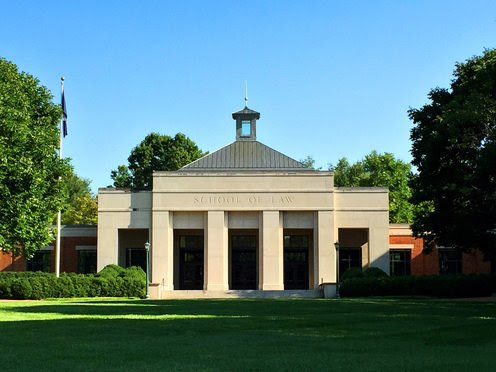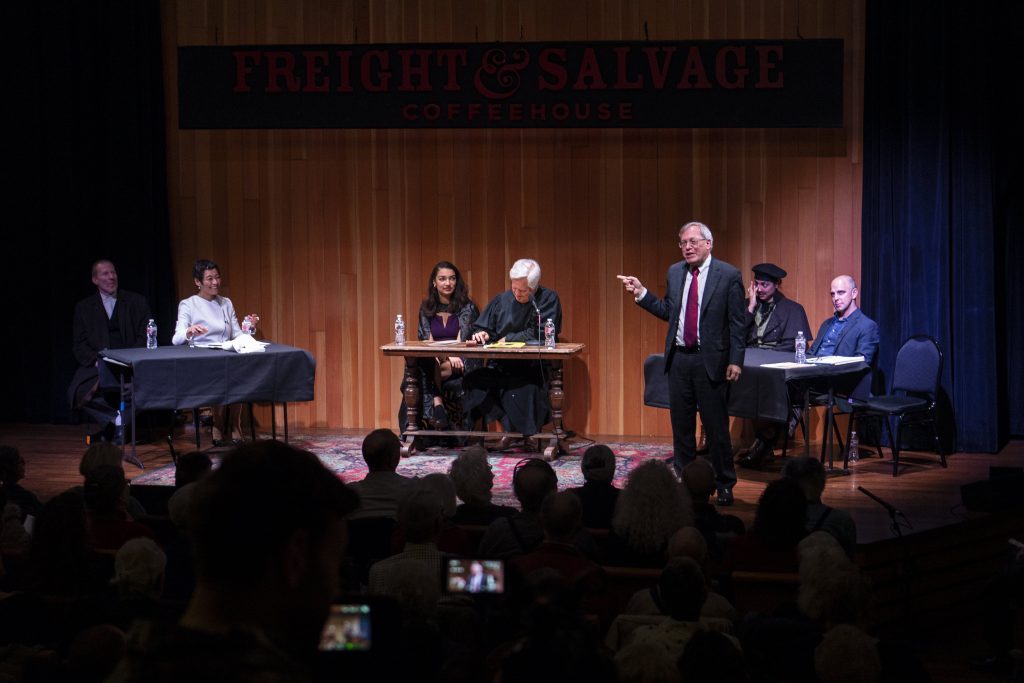Ahead of the Curve: Inside UVA's Law Dean Factory
This week's Ahead of the Curve looks at why UVA Law is so prolific in producing top law deans. Plus, Gonzaga Law catches heat for a new LGBTQ clinic.
February 25, 2020 at 12:28 PM
7 minute read
Welcome back to Ahead of the Curve. I'm Karen Sloan, legal education editor at Law.com, and I'll be your host for this weekly look at innovation and notable developments in legal education.
This week, I'm chatting with Virginia Law dean Risa Goluboff about why her school is so prolific in producing law deans. Just last week, George Washington tapped Virginia law professor Dayna Bowen Matthew as its incoming dean—the fifth woman from the faculty to go to lead a top school since 2012. Next up, I'm checking in on Gonzaga Law's launch of an LGBTQ+ clinic, which hasn't gone over well with everyone in the Catholic community. Finally, UC Berkley law dean Erwin Chemerinsky and UC Irvine law dean Song Richardson got a rematch in their mock trial over Shylock from the Merchant of Venice. How did it go for the fictional character? Read on.
Please share your thoughts and feedback with me at [email protected] or on Twitter: @KarenSloanNLJ

UVA's Law Dean Factory
Last week, I wrote this story about Virginia law professor Dayna Bowen Matthew being named the next dean of George Washington University Law School. An interesting nugget is in the article that I think deserves a bit more attention: Matthew becomes the fifth woman from the University of Virginia's School of Law's faculty to become dean of a top-25 school since 2012. That's a pretty impressive track record. (It also reminded me of this 2018 story I wrote about how Columbia Law dean Gillian Lester; Duke Law dean Kerry Abrams; and Northwestern Law dean Kimberly Yuracko all overlapped at Stanford Law as students in 1998.)
For the record, UVA's five women deans since 2012, in addition to Matthew, are: Elizabeth Magill, who was dean of Stanford Law School before returning to Virginia as provost; Jennifer Mnookin, who is now law dean at UCLA; Abrams, who as I noted earlier is currently dean at Duke Law; and Risa Goluboff, who was on the Virginia faculty before moving into the dean's office in 2016.
I wanted to know UVA's secret to producing so many leaders in legal education, particularly women. So I hopped on the phone with Goluboff, who had plenty to say on the subject. For starters, she noted, Virginia brings in top-flight faculty. (I'm pretty sure any dean of a top law school would tell me the same thing.) But there's more to it than just identifying and bringing in talented professors. Here's Goluboff:
"We put a lot of time and energy into providing people with leadership opportunities and mentoring them, and giving them the support they need. Part of it is that we have historically hired deans from within. We're constantly thinking about succession planning and developing leadership for our own law school. The dividends of that are that we're also developing leaders who become deans elsewhere."
The steady stream of deans coming out of the schools also gives faculty members leadership models to emulate, Goluboff told me. For instance, Mnookin and Magill were right around getting tenure when Goluboff arrived on campus as a junior faculty member. They served as role models, and Goluboff took note as they rose through the ranks.
But here's the thing about developing leaders on your faculty: Other schools will notice it and inevitably hire some away. That's OK with Goluboff.
"It is absolutely bittersweet. I'm so proud of Dayna and I'm excited to see what she will do at George Washington. We will miss her," Goluboff said. But the school is always thinking about its next generation of leaders, she added. "I don't worry that they won't be more. There will be more."
A LGBTQ Clinic Runs Into Opposition
Last month, Harvard Law School announced the launch of a new LGBTQ+ Advocacy Clinic, where students will work on litigation, policy initiatives and direct client representation to further the rights of LGBTQ+ clients. It joins a small but growing cohort of such clinics housed at law schools. But Harvard has lots of clinics and the addition didn't surprise me much.
Contrast that with the unveiling this month of Gonzaga University School of Law's new Lincoln LGBTQ+ Rights Center, which will cover much of the same ground as Harvard's new clinic. But there's a pretty significant difference between the two schools: namely that Gonzaga is a Jesuit (read, Catholic) university.
I wasn't the only one who was struck by the fact that a Catholic law school was launching a LGBTQ+ rights clinic. Thomas Daly, the Roman Catholic bishop of Spokane, said he has "serious concerns" about the clinic and is studying the matter.
"There is also a concern that Gonzaga Law School will be actively promoting, in the legal arena and on campus, values that are contrary to the Catholic faith and natural law," the diocese said in a statement to the Catholic News Agency.
Meanwhile, law dean Jacob Rooksby defended the new clinic as an opportunity for students to learn, "how law and the work of lawyers can further respect for individual dignity." The clinic will potentially take on matters including updating government identification cards; family law issues; and discrimination in housing, the workplace, and public service settings.
My take: Gonzaga may be the first Catholic law school to launch an LGBTQ+ rights clinic, but I doubt it will be the last. I think Rooksby makes a compelling case that these types of clinics are teaching tools that help a vulnerable population, and that transcends church doctrine.

Shylock Wins Again
Back in October, in this very briefing, I wrote about a fun mock trial in which UC Irvine Law dean Song Richardson represented Shylock, the vilified money-lender from Shakespeare's Merchant of Venice in an appeal of his legal fate in the play. (His estate was essentially parceled out to his enemies after he attempted to collect that infamous pound of flesh from protagonist Antonio.) UC Berkeley dean Erwin Chemerinsky represented the state in the mock trial, which took place at Irvine. But the Irvine jury ultimately sided with Richardson and Shylock, finding that he had been treated unfairly because he is Jewish.
Chemerinsky and Richardson faced off again last week, this time in Berkeley. But despite a new venue and jury, Shylock once again prevailed in court. Chemerinsky gamely argued that Shylock threatened Antonio and fully intended to harm him for failing to repay the loan he took out. But two-thirds of the audience voted to throw out Shylock's sentence given the years of harassment he had endured and the fact that his original trial was a sham. Is the third time the charm for the prosecution?
Extra Credit Reading
Concordia University School of Law will live to see another day. Less than two weeks after its parent university announced it will close at the end of the year, Concordia University, St. Paul—a different university—has agreed to take over the Boise law school.
The first-time bar passage rate nationwide rose to 80% in 2019, up from 75% the previous year, new data from the American Bar Association show.
Speaking of the bar exam, these 20 law schools had the highest first-time pass rates last year.
Thanks for reading Ahead of the Curve. Sign up for the newsletter and check out past issues here.
I'll be back next week with more news and updates on the future of legal education. Until then, keep in touch at [email protected]
This content has been archived. It is available through our partners, LexisNexis® and Bloomberg Law.
To view this content, please continue to their sites.
Not a Lexis Subscriber?
Subscribe Now
Not a Bloomberg Law Subscriber?
Subscribe Now
NOT FOR REPRINT
© 2025 ALM Global, LLC, All Rights Reserved. Request academic re-use from www.copyright.com. All other uses, submit a request to [email protected]. For more information visit Asset & Logo Licensing.
You Might Like
View All



Trending Stories
- 1Parties’ Reservation of Rights Defeats Attempt to Enforce Settlement in Principle
- 2ACC CLO Survey Waves Warning Flags for Boards
- 3States Accuse Trump of Thwarting Court's Funding Restoration Order
- 4Microsoft Becomes Latest Tech Company to Face Claims of Stealing Marketing Commissions From Influencers
- 5Coral Gables Attorney Busted for Stalking Lawyer
Who Got The Work
J. Brugh Lower of Gibbons has entered an appearance for industrial equipment supplier Devco Corporation in a pending trademark infringement lawsuit. The suit, accusing the defendant of selling knock-off Graco products, was filed Dec. 18 in New Jersey District Court by Rivkin Radler on behalf of Graco Inc. and Graco Minnesota. The case, assigned to U.S. District Judge Zahid N. Quraishi, is 3:24-cv-11294, Graco Inc. et al v. Devco Corporation.
Who Got The Work
Rebecca Maller-Stein and Kent A. Yalowitz of Arnold & Porter Kaye Scholer have entered their appearances for Hanaco Venture Capital and its executives, Lior Prosor and David Frankel, in a pending securities lawsuit. The action, filed on Dec. 24 in New York Southern District Court by Zell, Aron & Co. on behalf of Goldeneye Advisors, accuses the defendants of negligently and fraudulently managing the plaintiff's $1 million investment. The case, assigned to U.S. District Judge Vernon S. Broderick, is 1:24-cv-09918, Goldeneye Advisors, LLC v. Hanaco Venture Capital, Ltd. et al.
Who Got The Work
Attorneys from A&O Shearman has stepped in as defense counsel for Toronto-Dominion Bank and other defendants in a pending securities class action. The suit, filed Dec. 11 in New York Southern District Court by Bleichmar Fonti & Auld, accuses the defendants of concealing the bank's 'pervasive' deficiencies in regards to its compliance with the Bank Secrecy Act and the quality of its anti-money laundering controls. The case, assigned to U.S. District Judge Arun Subramanian, is 1:24-cv-09445, Gonzalez v. The Toronto-Dominion Bank et al.
Who Got The Work
Crown Castle International, a Pennsylvania company providing shared communications infrastructure, has turned to Luke D. Wolf of Gordon Rees Scully Mansukhani to fend off a pending breach-of-contract lawsuit. The court action, filed Nov. 25 in Michigan Eastern District Court by Hooper Hathaway PC on behalf of The Town Residences LLC, accuses Crown Castle of failing to transfer approximately $30,000 in utility payments from T-Mobile in breach of a roof-top lease and assignment agreement. The case, assigned to U.S. District Judge Susan K. Declercq, is 2:24-cv-13131, The Town Residences LLC v. T-Mobile US, Inc. et al.
Who Got The Work
Wilfred P. Coronato and Daniel M. Schwartz of McCarter & English have stepped in as defense counsel to Electrolux Home Products Inc. in a pending product liability lawsuit. The court action, filed Nov. 26 in New York Eastern District Court by Poulos Lopiccolo PC and Nagel Rice LLP on behalf of David Stern, alleges that the defendant's refrigerators’ drawers and shelving repeatedly break and fall apart within months after purchase. The case, assigned to U.S. District Judge Joan M. Azrack, is 2:24-cv-08204, Stern v. Electrolux Home Products, Inc.
Featured Firms
Law Offices of Gary Martin Hays & Associates, P.C.
(470) 294-1674
Law Offices of Mark E. Salomone
(857) 444-6468
Smith & Hassler
(713) 739-1250








